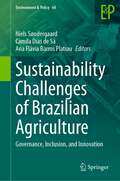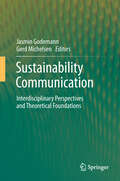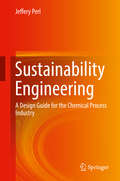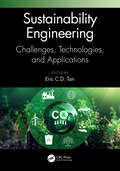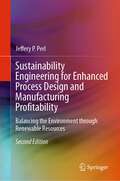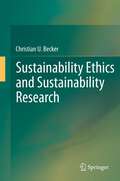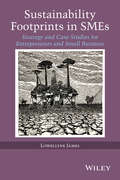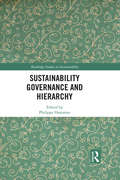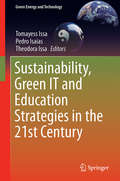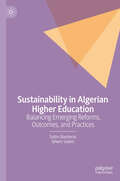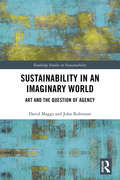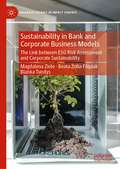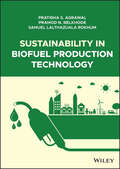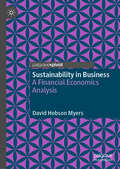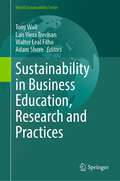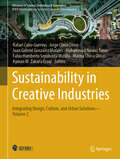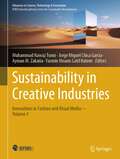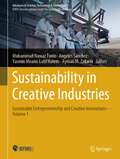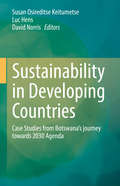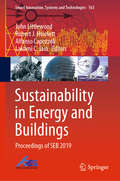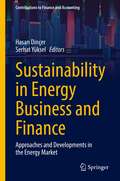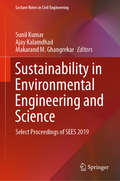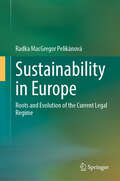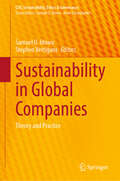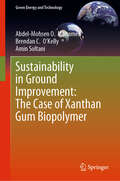- Table View
- List View
Sustainability Challenges of Brazilian Agriculture: Governance, Inclusion, and Innovation (Environment & Policy #64)
by Niels Søndergaard Camila Dias de Sá Ana Flávia Barros PlatiauWith contributions from a wide range of thematic areas, this book provides a diverse perspective on the contemporary environmental challenges of Brazilian agriculture. Assessing existing experiences of governance interventions, implementation of inclusive and sustainable production practices, as well as technical innovations, this edited volume presents the reader with a nuanced perspective on sustainable future pathways for Brazilian agriculture. In many cases, actors within the agricultural sector stand in a key position to address environmental concerns, which often has generated important breakthroughs and improvement of production practices. Drawing on contributions from authors within a variety of fields, this contribution presents a trans-disciplinary perspective on the problems and pathways through which multi-level interventions can lead to sustainable solutions within the Brazilian agricultural and livestock sector. This book hereby constitutes an informed and timely contribution to the important debates about Brazil’s potential role in confronting environmental problems. More broadly, this volume also sheds light on the process of agricultural transitions in the Global South, and how food security concerns may be reconciled with sustainable production.
Sustainability Communication
by Gerd Michelsen Jasmin GodemannModern and professional communication is required to realise the goal of sustainability in society. This book develops a theoretical and empirical framework, integrating interdisciplinary perspectives from communications theory, psychology, sociology, educational sciences, systems theory and constructivism. Its aim is to inform the establishment of sustainability communication. Complementing this theoretical framework, the book provides methods and concepts in a range of fields such as corporate practice, education and media. The book addresses the scientific community and students as well as communicators in all categories of sustainability communication.
Sustainability Engineering
by Jeffery PerlThis book explores sustainability engineering through the lens of the manufacturing and chemical process industries to elucidate the safe and economic implementation of process designs used to transform raw materials into useful finished products. The author applies the tenets of sustainability science to develop an engineering methodology that supports the perpetual availability of raw materials through recycling/reuse/repurposing, incorporates inexhaustible supplies, such as solar energy and municipal waste, and encompasses the husbandry of these resources in a manner that minimizes negative environmental impacts. Anyone involved in the design or manufacture of chemicals, or the upgrade of existing manufacturing processes, will benefit from this book's suggestions for identifying improvement options, while adding the pivotal aspect of sustainability to the usual cost and safety equation optimization elements.
Sustainability Engineering: Challenges, Technologies, and Applications
by Tan, Eric C.D.Sustainability Engineering: Challenges, Technologies, and Applications focuses on emerging topics within sustainability science and engineering, including the circular economy, advanced recycling technologies, decarbonization, renewable energy, and waste valorization. Readers will learn the trends driving today’s sustainability research and innovation as well as the latest in sustainable process technologies. This book: Addresses emerging sustainability development challenges, progress, and disruptive technologies Discusses biological sustainability, recycling technologies, and sustainable process design and manufacture Features a comprehensive view from renowned experts who are leaders in their respective research areas This work is aimed at an interdisciplinary audience of engineers and scientists working on solutions to advance the development and application of sustainable technologies, including – but not limited to – chemical and environmental engineers.
Sustainability Engineering for Enhanced Process Design and Manufacturing Profitability: Balancing the Environment through Renewable Resources
by Jeffery P. PerlNow in an expanded and revised second edition, this book explores sustainability engineering through the lens of the manufacturing and chemical process industries to explain the safe and economical implementation of process designs to transform raw materials into valuable finished products. The author applies the principles of sustainability science to engineering methodology for residential, commercial, and industrial applications that support the perpetual availability of raw materials through recycling, reuse, and repurposing to incorporate inexhaustible supplies and encompasses the management and conservation of these resources in a manner that minimizes negative environmental impacts. New sections include:Coverage of electric power opportunities and challenges (solar, wind, and cogeneration),Efficiency improvement as an energy supply extender, Recycling as a material extender. The book examines relevant energy policies driving and affecting commercial, industrial, and residential energy utilization and includes new industrial case studies. Anyone involved in the design or manufacture of chemicals or the upgrade of existing manufacturing processes will benefit from this book’s suggestions for identifying improvement options while adding the pivotal aspect of sustainability to the usual cost and safety equation optimization elements.
Sustainability Ethics and Sustainability Research
by Christian BeckerThe book identifies the specific ethical aspects of sustainability and develops ethical tools to analyze them. It also provides a methodological framework to integrate ethical and scientific analyses of sustainability issues, and explores the notion of a new type of self-reflective inter- and transdisciplinary sustainability research. With this, the book aims to strengthen the overall ability of academics to contribute to the analysis and solution of sustainability issues in an inclusive and integrated way.
Sustainability Footprints in SMEs
by Lowellyne JamesReviews the evolution and theory of Sustainability Footprints e.g. carbon footprint and examines the critical success factors and contributions to small to medium sized enterprises (SME) growth* Assist firms in achieving sustainable growth in four key areas Innovation Impact, Cost Impact, Environmental Impact, and Stakeholder Impact* Identifies the challenges and Critical Success Factors (CSFs) in the use of sustainability footprint methodology within small businesses by the use of case studies* Proposes a strategic model suitable for the deployment of sustainability strategy and initiatives within business
Sustainability Governance and Hierarchy (Routledge Studies in Sustainability)
by Philippe HammanSustainability Governance and Hierarchy provides a solid, theoretically and empirically grounded reflection on the concept of "sustainability governance". This idea has been growing in popularity in social science literature, as well as among decision-makers and governance actors, as it brings together two vast fields of study that have sometimes been dismissed as vague or ideologically loaded. In order to link the concepts of "sustainability" and "governance", the book is organized around the exploration of hierarchy issues, which often lie in the background of the existing literature but are not the focus of analysis. The chapters reflect ongoing controversies and dialogue between scientists with different theoretical and thematic backgrounds, who are all willing to participate in and contribute to a constructive effort to reach a more inclusive and more theoretically relevant stage for sustainability studies, being content with merely global analyses. The book is an innovative contribution to the hierarchy/non-hierarchy debate regarding governance arrangements in the field of sustainability and sustainability studies. This book will be of interest to advanced students and scholars focusing on governance issues, sustainability studies, environmental studies, as well as on the methodological aspects of the social sciences (economy, geography, law, philosophy, political science, sociology, urbanism and planning).
Sustainability, Green IT and Education Strategies in the Twenty-first Century
by Tomayess Issa Pedro Isaias Theodora IssaThis work presents and discusses the latest approaches and strategies for implementing Sustainability and Green IT into higher education and business environments. Following the global financial crisis in 2007/2008, businesses began to struggle coping with the increased IT/IS cost and their environmental footprint. As a consequence, action by universities to incorporate sustainability and ‘Green IT’ as parts of their teaching and learning materials, acknowledging their importance for global and local businesses, is being increasingly implemented. The book addresses the cooperation and coordination between academics and practitioners needed in order to achieve the changes required to obtain sustainability.Intended for researchers, lecturers and post-graduate students, as well as professionals in the Information Society and ICT and education sectors, and policy makers.
Sustainability in Algerian Higher Education: Balancing Emerging Reforms, Outcomes, and Practices
by Salim Bouherar Sihem SalemThis volume provides a comprehensive overview of the current state of sustainability in Algerian higher education. It examines the policies, initiatives, and practices that have been implemented across universities and other educational institutions, while also identifying the gaps and opportunities that remain. Through case studies, interviews, and analyses, the authors explore how these institutions are working to align their missions with the broader goals of sustainable development, and how they are contributing to the national and global discourse on sustainability.
Sustainability in an Imaginary World: Art and the Question of Agency (Routledge Studies in Sustainability)
by David Maggs John RobinsonSustainability in an Imaginary World explores the social agency of art and its connection to complex issues of sustainability. Over the past decade, interest in art’s agency has ballooned as an increasing number of fields turn to the arts with ever-expanding expectations. Yet just as art is being heralded as a magic bullet of social change, research is beginning to throw cautionary light on such enthusiasm, challenging the linear, prescriptive, instrumental expectations such transdisciplinary interactions often imply. In this, art finds itself at a treacherous crossroads, unable to turn a deaf ear to calls for help from an increasing number of ostensibly non-aesthetic fields, yet in answering such prescriptive urgencies, jeopardizing the very power for which its help was sought in the first place. This book goes in search of a way forward, proposing a theory of art aiming to preserve the integrity of arts practices within transdisciplinary mandates. This approach is then explored through a series of case studies developed in collaboration with some of Canada’s most prominent artists, including internationally renowned nature poet Don McKay; Italian composer and Head of Vancouver New Music, Giorgio Magnanesi; the renowned Electric Company Theatre, led by Kevin Kerr; and finally through a largescale multimedia installation aiming to reimagine the relationship between climate, culture, and human agency. Sustainability in an Imaginary World will be of great interest to students and scholars of arts-based research fields, sustainability studies, and environmental humanities.
Sustainability in Bank and Corporate Business Models: The Link between ESG Risk Assessment and Corporate Sustainability (Palgrave Studies in Impact Finance)
by Magdalena Ziolo Blanka Tundys Beata Zofia FilipiakThe book explains the impact of bank business models on company business models by discussing the relationship among banks decision-making processes, sustainable values creation in company business models, and ESG risk. The monograph provides a combination of financial and management-related activities, in the context of bank business models, taking into account the concept of sustainability, and will be of particular interest to both in-house practitioners, giving them innovative knowledge about the models presented and used, and to students and young researchers.
Sustainability in Biofuel Production Technology
by Pratibha S. Agrawal Pramod N. Belkhode Samuel Lalthazuala RokhumSustainability in Biofuel Production Technology Explore current challenges and the latest technologies in biofuel production In Sustainability in Biofuel Production Technology, a team of engineers and chemists delivers a thorough and accessible exploration of the source of renewable energy biofuels poised to help conserve natural resources and limit the impact of fossil fuel use. The book offers detailed information about the challenges and trends in biodiesel production and includes contributions from leading researchers in the field of biodiesel production. Readers will explore aviation biofuels, biofuel production technologies, reactor design and safety considerations, and the modelling and simulation of biofuel production as they move through the book’s 14 chapters. The authors also analyze the performance of biofuels along with cost estimations and mathematical modeling of various process parameters. Readers will also find: A thorough introduction to biofuels, including their history, generation, classification, and relevant technologies In-depth presentations of the production technologies of biofuels, including chemical and biological production processes Comprehensive explorations of the utilization of biofuels in aviation, including performance analyses and safety considerations Fulsome discussions of key issues and challenges in biofuels production pathways and the environmental effects of biofuels Perfect for academic researchers and industrial scientists working in the biofuels, bioenergy, catalysis, and materials science sectors, Sustainability in Biofuel Production Technology will also be suitable for members of regulatory bodies in the bioenergy sector.
Sustainability in Business: A Financial Economics Analysis
by David Hobson MyersThis book provides an approach to sustainable decision-making rooted in financial and economic literature. Financial economic techniques have the power to frame the discussion of sustainability to explain who, how, and why sustainability is a growing phenomenon in business and investing. Financial concepts in a sustainable framework provide a theoretical basis to approach research and business questions on sustainability. The framework provides for a better understanding of the different definitions of sustainability and the role those differences have on decisions that will lead to the future of sustainable business. A future which relies on growth driven by expanding its markets’ reach (demographics), its innovation or creation of new products, and its capital structure (leverage). Third party certification and governmental regulation become the constraints on that growth as well as the proof of sustainable growth. Finally, the ability and methods for investors to support sustainable growth is addressed in a modern portfolio theory analysis.
Sustainability in Business Education, Research and Practices (World Sustainability Series)
by Tony Wall Laís Viera Trevisan Walter Leal Filho Adam ShoreThe connections between sustainability and business education are becoming increasingly important due to the growing recognition of environmental and social challenges, as well as the role that businesses play in addressing these challenges. Businesses have a significant impact on the environment, society, and the economy. Issues such as climate change, resource depletion, social inequality, and ethical concerns directly affect business operations and performance. Business education needs to equip future leaders with the knowledge and skills to navigate these challenges responsibly. This book provides a platform for the dissemination of information on the latest initiatives and practices in these areas, and promotes future cooperation between universities and business schools across the globe.
Sustainability in Creative Industries: Integrating Design, Culture, and Urban Solutions—Volume 2 (Advances in Science, Technology & Innovation)
by Muhammad Nawaz Tunio Jorge Chica-Olmo Rafael Cano-Guervos Juan Gabriel González Morales Fabio Humberto Sepúlveda Murillo Marina Checa Olivas Ayman M. Zakaria EraqiThis book discusses the dynamic interplay of creativity and sustainability in the realm of design, offering a captivating exploration of innovative practices and their environmental impact. From biomimetic inspirations to biophilic designs, it unveils a spectrum of ideas in sustainable architecture. It further dives into inclusive and creative designs, social sustainability for the elderly amid the pandemic. This book casts a spotlight on the intricate synergy between preserving cultural heritage and fostering creative industries. It explores the profound significance of architectural lighting, the innovative reinterpretation of traditional motifs, and the enduring allure of heritage design within its chapters, creating an engaging and thought-provoking journey. Moreover, it ventures into the Integration of Creative Design in Urban Planning, presenting a futuristic outlook that seamlessly blends technology, sustainability, and human-centric solutions. Designed for a wide audience, including professionals, educators, and students, this book is a compelling resource for those passionate about the intersection of creativity and sustainability. It offers thought-provoking ideas, informative case studies, and a glimpse into the future of design that transcends boundaries.
Sustainability in Creative Industries: Innovations in Fashion and Visual Media—Volume 3 (Advances in Science, Technology & Innovation)
by Muhammad Nawaz Tunio Jorge Miguel Chica Garcia Ayman M. Zakaria Yasmin Moanis Latif HatemIn this volume, sustainable creative industries become a beacon for innovative change, forging a path towards a conscious, harmonious world. This volume offers a panoramic view of the future, where innovations in fashion and visual media blend seamlessly with a commitment to a more sustainable and impactful world. More specifically, this volume explores the compelling interplay of sustainability, creativity, and advocacy, casting a spotlight on the transformative potential within fashion and visual media. It embarks on a journey through the innovative landscapes of fashion, where sustainability takes center stage, through an exploration of genderless mode development, contemporary patterns, and reimagined design strategies that breathe new life into tradition. As readers explore the chapters within, the symbiotic relationship between visual media and sustainability emerges, further delve into the evolution of visual communication design and the potency of Instagram microblogs in shaping perceptions and awareness. Furthermore, the role of design in disseminating critical information during disasters is unveiled and the ways in which narrative methods can ignite meaningful change explored.
Sustainability in Creative Industries: Sustainable Entrepreneurship and Creative Innovations—Volume 1 (Advances in Science, Technology & Innovation)
by Muhammad Nawaz Tunio Angeles Sánchez Yasmin Moanis Latif Hatem Ayman M. ZakariaThis book discusses a compelling array of topics at the intersection of entrepreneurship, education, and technological innovation within the creative industries. It delves into a captivating exploration of sustainable entrepreneurship in Part 1, where key characteristics of sustainable entrepreneurs and factors influencing entrepreneurial intention are dissected. By unearthing the nexus between entrepreneurial alertness, networking capability, and venture performance, it provides intriguing insights into sustaining traditional crafts and brands amid the COVID-19 pandemic. The following parts not only unveil current innovative pedagogical strategies in creative design education but propels you into the future, exploring the harmonious fusion of academia and industry in sustainability-driven programs. Designed for educators, students, researchers, and practitioners in entrepreneurship, design, and technology fields, this book offers a transformative journey into sustainable practices, innovative pedagogies, and cutting-edge advancements. Engaging, informative, and thought-provoking, it is a must-read for those seeking to shape the future of creative industries through entrepreneurship, education, and innovation.
Sustainability in Developing Countries: Case Studies from Botswana’s journey towards 2030 Agenda
by Susan Osireditse Keitumetse Luc Hens David NorrisThis book illustrates an alternative approach to ‘state of sustainability’ reporting by presenting cross-sectoral and multi-disciplinary discussions on sustainability issues in the context of a developing country, Botswana. The book volume illustrates how academic publishing can supplement African governments' existing forms of reporting on sustainability by providing on-ground detailed descriptions and experiences relating to achievement of the various sustainable development goals (SDGs). In addition, this process involves, increases and enhances diversity of stakeholders that report on sustainability. Furthermore, the approach resonates with the UN’s recommendation to build local strategies for implementation of the 2030 agenda for sustainable development. Conventional reporting on sustainability by most African countries is an exercise that is customarily the preserve of designated government ministries. While this form of reporting provides a consistent platform for tracking sustainable development goals, it can also benefit from juxtaposition with in-depth descriptions and experiences provided by academic publishing. Academia, through publishing, provides a framework for on-ground situation-analysis as well as in-depth descriptions of African country’s grass-root experiences, thus allowing for temporal tracking of sustainable development milestones. As this volume illustrates, experiences from the various contributors on this volume highlight different points of departure towards achieving the 2030 agenda. Topics covered include biodiversity, water management, world heritage, environment, education, tourism, gender, institutional approaches to achievement of SDGs, as well as contribution of non-governmental organisations (NGO)'s amongst others.
Sustainability in Energy and Buildings: Proceedings of SEB 2019 (Smart Innovation, Systems and Technologies #163)
by John Littlewood Robert J. Howlett Alfonso Capozzoli Lakhmi C. JainThis volume contains the proceedings of the 11th KES International Conference on Sustainability and Energy in Buildings 2019 (SEB19) held in Budapest, 4th -5th July 2019 organised by KES International in partnership with Cardiff Metropolitan University, Wales, UK. SEB-19 invited contributions on a range of topics related to sustainable buildings and explored innovative themes regarding sustainable energy systems. The aim of the conference was to bring together researchers, and government and industry professionals to discuss the future of energy in buildings, neighbourhoods and cities from a theoretical, practical, implementation and simulation perspective. The conference formed an exciting chance to present, interact, and learn about the latest research and practical developments on the subject. The conference attracted submissions from around the world. Submissions for the Full-Paper Track were subjected to a blind peer-review process. Only the best of these were selected for presentation at the conference and publication in these proceedings. It is intended that this volume provides a useful and informative snapshot of recent research developments in the important and vibrant area of Sustainability in Energy and Buildings.
Sustainability in Energy Business and Finance: Approaches and Developments in the Energy Market (Contributions to Finance and Accounting)
by Hasan Dinçer Serhat YükselThis edited volume seeks to identify the sustainability issues currently affecting the energy business and finance. For this purpose, a broad range of perspectives on sustainability issues in the energy business and finance are taken into consideration in the context of renewable business projects. In turn, several novel strategies from the energy business and finance are illustrated with regard to sustainable organizational factors, technological infrastructure, financial facilities, economic development, and investment potential. Comparing and contrasting different sustainability perspectives can help to develop the most appropriate and successful business strategies for the sustainable energy business and finance. This book presents multidimensional analyses of sustainability issues with regard to renewable energy projects and identifies the most promising strategies, as well as efficient market conditions for the energy business.
Sustainability in Environmental Engineering and Science: Select Proceedings of SEES 2019 (Lecture Notes in Civil Engineering #93)
by Sunil Kumar Ajay Kalamdhad Makarand M. GhangrekarThis book consists of select peer-reviewed papers from the International Conference on Sustainable Environmental Engineering and Science (SEES) 2019. The main focus of the book is to propose sustainable technologies to address the growing environmental challenges. The contents cover several topics of relevance such as air pollution, solid waste management, wastewater treatment, industrial pollution, and suggests eco-friendly and cost-effective techniques to tackle them. Given the range of topics covered, the book will be useful to researchers and professionals working in the multidisciplinary area of sustainability.
Sustainability in Europe: Roots and Evolution of the Current Legal Regime
by Radka MacGregor PelikánováThis book analyses the roots and evolution of the concept of sustainability in Europe and the European Union. As sustainability has always mirrored certain value judgments on justice and priorities, it is suitable for functionalist, analytical, contextual and historical comparisons via multidisciplinary studies combining various branches of the social sciences, law, philosophy, and economics. The aim of this book is to explore the roots and evolution of sustainability, so as to reveal how a European style of sustainability has emerged, one that is inextricably linked to our civilization and history. It identifies linear and cyclical phases with clear trends toward expanding the reach of sustainability, its subjects and their duties. The book offers a multidisciplinary, chronological and contextual overview of the evolution of sustainability until the 21st century, while also addressing its legal regime. Sustainability has many faces and needs to be approached in a dynamic manner through the lens of sustainable development or via a multi-stakeholder model that includes private subjects and corporate social responsibility. Although primarily intended for an audience with an advanced background in law, economics and philosophy, the book will also benefit a more general audience, particularly those who want to learn where the current sustainability concerns and legal regime actually came from.
Sustainability in Global Companies: Theory and Practice (CSR, Sustainability, Ethics & Governance)
by Samuel O. Idowu Stephen VertigansThis textbook focuses on how sustainability is practiced in companies in different sectors of the global economy - examples include aviation, banking, energy, financial services, food, manufacturing, technology, transportation, and tourism. These corporate sectors are at the forefront of the debate around business and sustainability both in their usage of finite resources and their potential to deliver meaningful solutions. Consequently, several experts were brought together for this book and asked to focus on how sustainability is understood and practiced in different companies around the globe in terms of the UN Sustainable Development Goals 2030. Chapters incorporate theoretical and applied examples that can help improve levels of insight into international business approaches. They provide opportunities to learn and disseminate factors that are delivering short, medium, and long-term solutions and problems. These insights can incorporate the spectrum of activities required inorder to achieve sustainability through industrial processes, supply chains to consumer behavior. The multi-disciplinary nature of the fundamental issues also prompted a diverse selection of academics and practitioners across disciplines who have knowledge and/or experiences of sustainability and international business theories, practices, and processes. Students and academics from across related disciplines, corporations, policymakers, and members of societies who study or have an interest in sustainable development will particularly find this book useful.
Sustainability in Ground Improvement: The Case of Xanthan Gum Biopolymer (Green Energy and Technology)
by Abdel-Mohsen O. Mohamed Brendan C. O’Kelly Amin SoltaniSustainable soil stabilization solutions aim to maintain a perfect balance between infrastructure performance and the social, economic and ecological processes required to sustain human equity, diversity, and the functionality of natural systems. To this end, biopolymers, either chemically synthesized from biological matter or biosynthesized by living organisms, are exhibiting great promise as a financially competitive and green alternative for conventional calcium-based binders. Recent experimental studies have shown that soils stabilized by polysaccharide-type biopolymers, such as xanthan gum (XG), exhibit a variety of promising physical and mechanical treatments, including improved water-retention capacity, reduced compressibility and hydraulic conductivity, enhanced shear strength, and improved resistance against wind/water erosion. Despite these advancements, the existing literature reveals numerous inconsistencies, and a thorough understanding of the behaviour/properties of XG-treated soils under diverse loading and environmental conditions remains somewhat elusive. More importantly, there remains a notable gap in understanding how different factors affect the interactions between XG and various soil types throughout the processes of mixing, curing, and later environmental exposure. This book represents the first of its kind, offering a comprehensive, fundamental overview of the current state of XG usage for sustainable ground improvement, while also identifying future research directions towards addressing existing gaps in knowledge and application.
